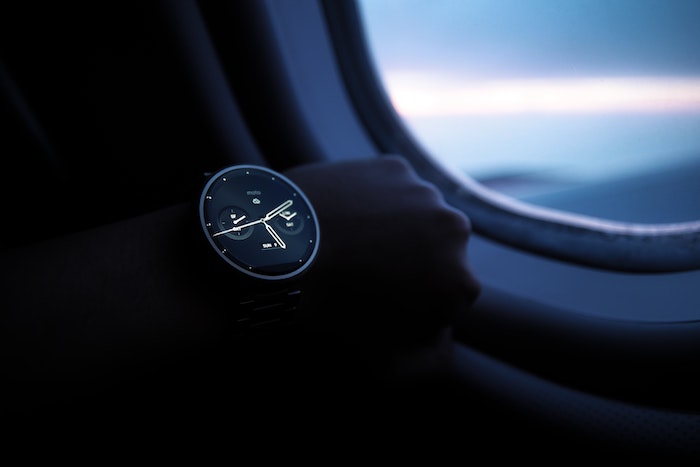This post is also available in:
 Español
Español
The human being has a series of routines and internal schedules within which different vital activities are performed. Rest is a primordial (and pleasant) activity thanks to which we can be efficient and effective during the day. It is for this reason that it is recommended to sleep between 7 and 9 hours a day.
What is jet lag
One of the phenomena with the greatest capacity to completely disarticulate this internal clock is jet lag disorder, which means time decompensation. It is also known as rapid time zone change syndrome, transoceanic syndrome, circadian dysrhythmia or time zone syndrome.
Jet lag consists of an imbalance produced in the internal clock of a person who makes a drastic time change when traveling to places over long distances and crossing several time regions.

In a summarized and practical way: you will have jet lag disorder if you travel to distant places and with a lot of time difference with the country of origin (usually when changing continents). What happens then is that the body will keep the time of the place of departure not adapting to that of the destination. What happens then?
Jet lag symptoms
The symptoms of jet lag are very similar to those of altitude sickness. The main one is the general tiredness or fatigue, because you will be sleepy during the day, when you want to enjoy the time, and you will not be able to sleep at night. The result? Accumulated tiredness that added to the mismatch of meals can cause vomiting.
Bolivia for example, is a country at high altitude, so if you plan a trip to Uyuni Salt Flats, you will almost certainly get altitude sickness and jet lag disorder. Therefore it is important not to do crazy things the first day and give time to your body.
Going back to jet lag and to finish off, one must take into account the possibility of reduced concentration, which has repercussions on the lack of memory. When you are tired you tend not to pay so much attention to the things around you and to retain less information.
How long does the jet lag take?
Each body is different and the management of its symptoms is very important when it comes to ending this disease. It also depends a lot on the time difference and the solar conditions of the destination. Normally the biological clock takes around 2 and 5 days to adapt.

How to avoid jet lag disorder
When you make a long trip in which you cross numerous time zones, it is very likely that the time difference will cause a series of impediments in your daily life until you manage to adapt.
The good news? You don’t have to wait to get to your destination to fix the symptoms. There are a number of tips that can help you avoid jet lag:
- Try to adapt your body before traveling to the new time zone by moving your sleep time forward or backward. It would be advisable to start making these changes several weeks in advance.
- Lead an active and healthy life, if you are a healthy person, the effects of jet lag are probably less.
- Stay hydrated during the flight and avoid caffeine-containing products, as they alter sleep patterns.
- In case of very long trips it would be advisable to make a stop in it and rest in some city before continuing to the destination. If your idea is to travel from Europe through Latin America, you better go to Argentina first (GMT -3) and then Colombia (GMT -5) and Peru (GMT -5). In this way you can visit Perito Moreno, discover Lost City and tour Machu Picchu
How to fight jet lag
Once in the destination country, there are other tips that can help you fight jet lag:
- Keep the time of destination, avoiding sleeping for a long time when it is not time to sleep, although it sounds absurd to mention it, may be one of the most important.
- Devote at least a little time of the day to perform some activity a little more intense that requires some extra effort to spend energy in order to have an easier dream, a trekking in Torres del Paine if you are in Chile would be enough.
- Make light meals to avoid bad digestion and that may cause greater fatigue
- Spend time in the sun. Exposure to the sun during the day makes your body be oriented in the new schedule and provides stability.
Jet lag and melatonin

If the advices to avoid and fight jet lag do not convince you, your best ally, both to avoid and to fight jet lag, is the use of melatonin in determined doses that you better consult with the doctor.
This hormone that our body synthesizes is considered to be the most effective medicine against jet lag. Especially if 5 or more time zones have been crossed on the same trip and the trip has been made in an easterly direction.
What is melatonin?
Melatonin is a hormone produced naturally by the body by the pineal gland. It is an organ the size of a pea that is located just above the middle of the brain. The melatonin secreted by this gland is what helps our body know when it is time to sleep and when to wake up.
The levels of melatonin secreted by our body start to increase in the afternoon after sunset. While they fall in the morning when the sun rises. The amount of light it receives each day, plus our own biological clock, are some of the factors that help our brain determine the amount produced.
Melatonin as medicine
In addition to the own produced by our body there’s also the option to take melatonin supplements to fight jet lag. These come in tablet, liquid and chewable form. You can find them in natural or synthetic forms.
Doses between 0,5 mg and 5 mg of melatonin appear to be equally effective in helping people to fall asleep, although the higher the dose, not exceeding 5 mg, the earlier and better the quality of sleep.
The way to take it to decrease the effects of jet lag is having it 30 minutes before bedtime. It is recommended to start taking it a few days before the trip to get use to it when you arrive at your destination.
Jet lag is a bit tedious, but it’s part of the experience and being able to say you’ve suffered it is a luxury because it means you’ve traveled. So it’s not about being afraid of it. If you take steps to avoid it and fight it, you’ll hardly notice it, so when do you plan your little battle against jet lag?






